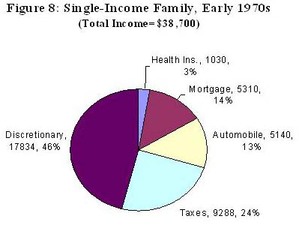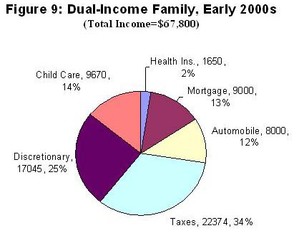The Conservatism of Progressives
Despite having a lot of respect for the intellect and the insane eclecticism of its author Tyler Cowen, I have never read the Complacent Class. The title really did not intrigue me, and frankly from that title probably had the wrong vision of what the book was about. That is, until I read George Will's recent review, in which he said in part:
In 1800, McCloskey says, the world’s economy was where Bangladesh’s economy now is, with no expectation of change. Today, most of the jobs that existed just a century ago are gone. And we are delighted that this protracted disruption occurred. Now, however, the Great Enrichment is being superseded by the Great Flinch, a recoil against the frictions and uncertainties — the permanent revolution — of economic dynamism. If this continues, the consequences, from increased distributional conflicts to decreased social mobility, are going to be unpleasant.
Although America is said to be — and many Americans are — seething about economic grievances, Tyler Cowen thinks a bigger problem is complacency. In his latest book, “The Complacent Class: The Self-Defeating Quest for the American Dream,” Cowen, professor of almost everything (economics, law, literature) at George Mason University and co-author of the Marginal Revolution blog, argues that the complacent class, although a minority, is skillful at entrenching itself in ways detrimental to the majority....
For complacent Americans, a less dynamic, growth-oriented nation seems less like an alarming prospect than a soothing promise of restfulness. In a great testimonial to capitalism’s power, “The Communist Manifesto,” Karl Marx wrote: “All fixed, fast-frozen relations, with their train of ancient and venerable prejudices and opinions, are swept away, all new-formed ones become antiquated before they can ossify. All that is solid melts into air.” Complacent, because comfortable, Americans have had enough of that.
Hmm, I suppose I should read it. I don't want to judge the premise of the book from a few lines of a 3rd party review, but the themes here are strikingly similar to something I wrote 13 years ago (!) on this blog in a post titled "Progressives are too Conservative to Like Capitalism". I still agree with much, though not all, of what I wrote there so I will pare it down a bit:
Most "progressives" (meaning those on the left to far left who prefer that term) would freak if they were called conservative, but what I mean by conservative in this context is not donate-to-Jesse-Helms capital-C Conservative but fearful of change and uncomfortable with uncertainty conservative.
OK, most of you are looking at this askance - aren't progressives always trying to overthrow the government or something? Aren't they out starting riots at G7 talks? The answer is yes, sure, but what motivates many of them, at least where it comes to capitalism, is a deep-seated conservatism.
Before I continue to support this argument, I must say that on a number of issues, particularly related to civil liberties and social issues, I call progressives my allies. On social issues, progressives, like I do, generally support an individual's right to make decisions for themselves, as long as those decisions don't harm others.
However, when we move to fields such as commerce, progressives stop trusting individual decision-making. Progressives who support the right to a person making unfettered choices in sexual partners don't trust people to make their own choice on seat belt use. Progressives who support the right of fifteen year old girls to make decisions about abortion without parental notification do not trust these same girls later in life to make their own investment choices with their Social Security funds. ... [this would also make a good example: Progressives oppose school choice because they don't think the poor capable of making good education decisions]
Beyond just the concept of individual decision-making, progressives are hugely uncomfortable with capitalism. Ironically, though progressives want to posture as being "dynamic", the fact is that capitalism is in fact too dynamic for them. Industries rise and fall, jobs are won and lost, recessions give way to booms. Progressives want comfort and certainty. They want to lock things down the way they are. They want to know that such and such job will be there tomorrow and next decade, and will always pay at least X amount. That is why, in the end, progressives are all statists, because, to paraphrase Hayek, only a government with totalitarian powers can bring the order and certainty and control of individual decision-making that they crave.
Progressive elements in this country have always tried to freeze commerce, to lock this country's economy down in its then-current patterns. Progressives in the late 19th century were terrified the American economy was shifting from agriculture to industry. They wanted to stop this, to cement in place patterns where 80-90% of Americans worked on farms. I, for one, am glad they failed, since for all of the soft glow we have in this country around our description of the family farmer, farming was and can still be a brutal, dawn to dusk endeavor that never really rewards the work people put into it.
This story of progressives trying to stop history has continued to repeat itself through the generations. In the seventies and eighties, progressives tried to maintain the traditional dominance of heavy industry like steel and automotive, and to prevent the shift of these industries overseas in favor of more service-oriented industries. Just like the passing of agriculture to industry a century ago inflamed progressives, so too does the current passing of heavy industry to services.
In fact, here is a sure fire test for a progressive. If given a choice between two worlds:
- A capitalist society where the overall levels of wealth and technology continue to increase, though in a pattern that is dynamic, chaotic, generally unpredictable, and whose rewards are unevenly distributed, or...
- A "progressive" society where everyone is poorer, but income is generally more evenly distributed. In this society, jobs and pay and industries change only very slowly, and people have good assurances that they will continue to have what they have today, with little downside but also with very little upside.
Progressives will choose #2. Even if it means everyone is poorer. Even if it cuts off any future improvements we might gain in technology or wealth or lifespan or whatever. They want to take what we have today, divide it up more equally, and then live to eternity with just that. Progressives want #2 today, and they wanted it just as much in 1900 (just think about if they had been successful -- as just one example, if you are over 44, you would have a 50/50 chance of being dead now).
Don't believe that this is what they would answer? Well, first, this question has been asked and answered a number of times in surveys, and it always comes out this way. Second, just look at any policy issue today. Take prescription drugs in the US - isn't it pretty clear that the progressive position is that they would be willing to pretty much gut incentives for any future drug innovations in trade for having a system in place that guaranteed everyone minimum access to what exists today? Or take the welfare state in Continental Europe -- isn't it clear that a generation of workers/voters chose certainty over growth and improvement? That workers 30 years ago voted themselves jobs for life, but at the cost of tremendous unemployment amongst the succeeding generations?

